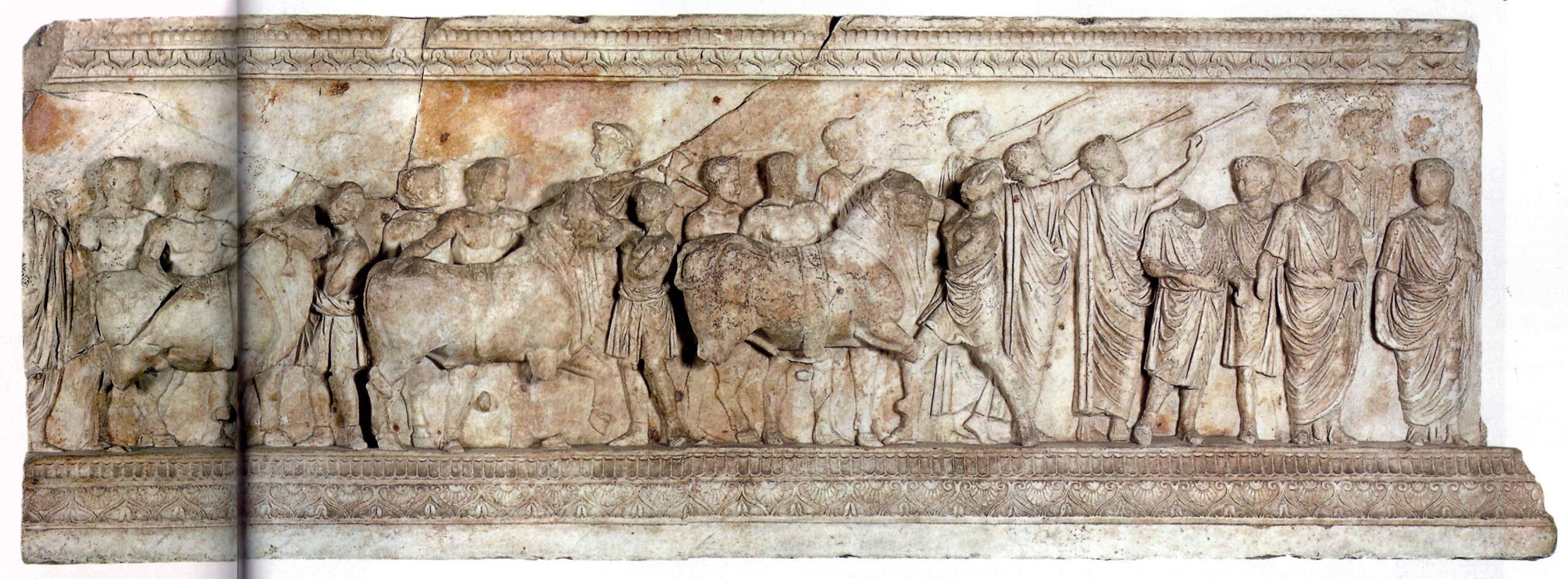| TITLE Alkesippus of Kalydon’s pompe (sacrifice and public feast at Delphi) |
| DATE 182-181 BCE |
| TEXT The Packard Humanities Institute (SGDI II 2101). See also: SEG 25, 175. [1] ἄρχοντος Δαμοσθένεος μηνὸς Ποιτροπίου, ἐπὶ τοῖσδε ἀνέθηκε Ἀλκέσιππος [2] Βουθήρα Καλυδώνιος τῶι θεῶι καὶ τᾶι πόλει τᾶι Δελφῶν χρυσοῦς ἑκατὸν τρι- [3] άκοντα καὶ ἀργυρίου μνᾶς εἴκοσι δύο στατῆρας τριάκοντα, εἴ τί κα πάθη [4] Ἀλκέσιππος, ὥστε θυσίαν καὶ δαμοθοινίαν συντελεῖν τὰν πόλιν τῶν Δελφῶν [5] τῶι Ἀπόλλωνι τῶι Πυθίωι κατ’ ἐνιαυτὸν ποτονομάζοντας Ἀλκεσίππεια ἀπὸ [6] τῶν τόκων τοῦ τε χρυσίου καὶ ἀργυρίου, συντελεῖν δὲ τὰν θυσίαν ἐν τῶι Ἡραίωι [7] μηνί, πονπεύειν δὲ ἐκ τᾶς ἅλωος τοὺς ἱερεῖς τοῦ Ἀπόλλωνος καὶ τὸν ἄρχοντα [8] καὶ τοὺς πρυτάνεις καὶ τοὺς ἄλλους πολίτας πάντας. ἀναγραψάντω δὲ οἱ ἄρ- [9] χοντες ἐν τῶι ἱερῶι καὶ ἁ ἀνάθεσις κυρία ἔστω. καὶ τὰ ἄλλα πάντα τὰ ἴδια {α} [10] ἀνατίθητι, εἴ τί κα πάθη, τῶι θεῶι καὶ {καὶ} το͂ι πόλει, καὶ Θευτίμαν τὰν ἰδίαν [11] θεράπαιναν ὥστε ἐλευθέραν εἶμεν αὐτάν, εἴ τί κα πάθη. Θαψάντω δὲ Δάμιππος [12] καὶ Θευτίμα καὶ Ἀγέας καὶ Πισίλαος ἀπὸ τῶν χαλκῶν, τῶν καταλιμπάνει πα- [13] ρ’ αὐσαυτόν, καὶ λόγον ἀποδόντω τᾶι πόλει. μάρτυροι· Κριτόλαος, Λάτροπος, [14] Ἀγέας, Πολεμοκράτης, Ἀγασίδαμος, Γενναῖος, Ξενοκράτης Μεδεώνιος, Στρά- [15] ταγος, Καλλικλῆς, Ἀνδρόνικος, Πισίλαος, Δεξικράτης, Χαρίξενος, Πολέμαρ[χ]- [16] ος Παυσανία. τὰς διαθήκας φυλάσσει Ἄθαμβος, Ἀγέας, Πεισίλαος. |
| TRANSLATION Sylloge Inscriptionum Graecarum 631. When Damosthenes was archon, in the month of Poitropios, Alkesippos of Kalydon the son of Boutheras dedicated one hundred and thirty gold pieces and twenty-two minas and thirty staters of silver to the god and to the city of Delphi, on these terms: if Alkesippos suffers anything {dies}, the city of Delphi shall perform a sacrifice and public feast to Pythian Apollo every year, which they shall call Alkesippeia, from the interest produced by the gold and silver. The sacrifice shall be performed in the month of Heraios; and the priests of Apollo and the archon and the prytaneis and all the other citizens shall go in procession from the “threshing-floor” { halos }. The magistrates shall inscribe this in the temple, and the offering shall be valid; and all his other personal possessions shall be dedicated, if he suffers anything, to the god and the city; and Theotima his personal maidservant shall be made free if he suffers anything; and Damippos, Theotima, Ageas and Pisilaos shall perform his burial, using the bronze money that he deposited with them, and they shall render an account of this to the city. Witnesses: Kritolaos, Latropos, Ageas, Polemokrates, Agasidamos, Gennaios, Xenokrates of Medeon, Stratagos, Kallikles, Andronikos, Pisilaos, Dexikrates, Charixenos, Polemarchos son of Pausanias. The testament shall be kept by: Athambos, Ageas and Peisilaos. |
| BIBLIOGRAPHY Bömmer (1952), RE, s.v. Pompa. Herrscher, Vol. XXI.2, p. 1963, n. 267. Guarducci, M. (1974). Epigrai a Greca. III. Epigrai di carattere privato. Rome: Istituto poligraico dello Stato, Libreria dello Stato, 256-257. Harter-Uibopuu, K. (2011). “Money for the polis. Public administration of private donations in Hellenistic Greece”. In: O. M. van Nijf and R. Alston, eds., Political Culture in the Greek City after the Classical Age. Leuven–Paris: Peeters, 121. Laum, B. (1914). Stiftungen in der Griechischen und Römischen Antike: Ein Beitrag zur Kulturgeschichte. Leipzig– Berlin: Teubner, no. 27. Mannzmann, A. (1962). Griechische Stiftungsurkunden. Münster: Aschendorff, 146-147. Sokolowski, F. (1969). Lois sacrées des cités Grecques. Paris: De Boccard, 164-165, no. 81. Woodhead, A. G., ed., (1971). “SEG 25-575. Delphi. Testamentum Alcesippi, et feriae Alcesippea institutae, a. 182a”. In: Supplementum Epigraphicum Graecum. 25, 575. Amsterdam. |
